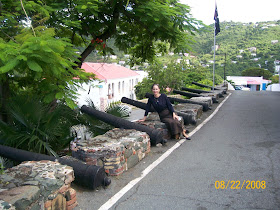What is Historical Fiction?
Is it a boring lecture about
history you're forced to sit through in 8th grade? Is it a bodice-ripping, powdered-wig romp? Well, yes—and no. People who immerse themselves in
history say it's anything but boring. Sometimes they say it's even shocking. Reading the memoirs of a Victorian explorer, a fugitive slave, or a Concentration Camp
survivor puts you in their shoes and shows you a world you never knew existed. By reading between the lines, making logical
deductions, and perhaps embellishing some of the unknown, the writer of Historical
Fiction can bring a one- or two-dimensional character to life. The
possibilities for setting, plot, and characters are limited only by the
imagination of the author. And thankfully, the possibilities for intrigue and entertainment
are endless.
So what exactly is Historical Fiction?
The generally accepted definition is a novel set in the past, usually 50 years before the date of publication.
Now, to make things even more complicated, Amazon has added 25 sub-categories for Historical Fiction.
Now you can search not only by setting and genre (as in thriller or suspense) but by time period as well. For those of you who like Historical Romance you may continue to search under the Romance subcategories for new releases.
The generally accepted definition is a novel set in the past, usually 50 years before the date of publication.
Now, to make things even more complicated, Amazon has added 25 sub-categories for Historical Fiction.
Now you can search not only by setting and genre (as in thriller or suspense) but by time period as well. For those of you who like Historical Romance you may continue to search under the Romance subcategories for new releases.
For illustrative purposes, I have listed a few examples from each subcategory (with the exception of Religious and Short Stories). Pick a category at random and dive in. You never know, you might learn something your 8th grade history teacher failed to mention...
Fantasy: The Golem
and the Jinni, Deck Z, The Spirit Keeper, The Witch's Daughter
Classics: Dr.
Zhivago, A Tale of Two Cities, Forever Amber
Mystery, Thriller & Suspense: The White Princess, The
Key to Rebecca, Hornet Flight, The Odessa
File, The Eye of the Needle, The Abominable, Pillars of the Earth
Regency: Mr. Darcy's Noble Connection, Mr. Darcy's
Promise, and all the Mr. Darcy Spinoffs,
The Arrangement, Lord Love a Duke
Women's Fiction: The
Sisterhood, The Paris
Wife, Rainwater, War Brides
African: Roots,
Cleopatra: A Life, Nefertiti: A Novel, A Spear of Summer Grass, The Heretic
Queen, The Princess of Egypt
Must Die, The Burning Shore
Asian: The Last
Empress, The Ghost Bride, The Far Pavilions, The Sandalwood Tree, The
Maharajah's General, Race to Tibet
Australian & Oceania:
The Thorn Birds, The Light Between the Oceans, Fiji , A Wicked Deception
British: Wolf Hall, Bring up the Bodies, The Tudor Books,
The Regency Books, Paths of Glory, Remarkable Creatures, The Orchid House, The
Captain's Daughter, The Kingmaker's Daughter, The
Other Boleyn Girl, The White
Queen, Pillars of the Earth, Fall of Giants, Queen Elizabeth's Daughter, The Chalice, The Crown
Caribbean & Latin America: Island Beneath the Sea, The
Pirate's Daughter, Brazil, 100 Years of Solitude, The General in his Labyrinth,
Pirate Latitudes, Transfer Day, Wide Sargasso
Sea, Island on Fire, and The Lost Diary of Alexander Hamilton
Chinese: Shanghai Girl, The Valley of Amazement
European: Mozart's Sister, The Girl with the Pearl Earring, Marrying Mozart, The Lost Wife, Hornet
Flight, The Visit of the Royal Physician, Loving Søren, The Time in Between
French: An Officer
and a Spy, Day of the Jackal, Sarah's Key, A Place of Greater Safety,
Claude and Camille, Sunflowers, Madame Tussaud, The Lavender Garden, Paris
German: She Wore only White, City of Women , All Quiet on the Western Front
Irish: The Girl on
the Cliff, The Princes of Ireland ,
The Yellow House, Galway
Bay
Italian: The
Shoemaker's Wife, The Midwife of Venice ,
The Contessa's Vendetta, The Light in the Ruins, The Book of Madness &
Cures
Japanese: Memoirs of a Geisha, King Rat, Shogun, The Gilded
Fan, the Mask Carver's Son
Middle Eastern: The Haj, Exodus, Jasmine Nights, Jerusalem Maiden, Birds
Without Wings, The Source, The Dovekeepers, Ben-Hur
Norse & Icelandic: Burial Rites, Oleanna,
Russian: Rasputin's
Shadow, The Winter
Palace
Scottish: Drums of Autumn and Anything with Highlander in
the title











.jpg)























